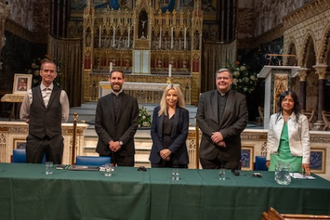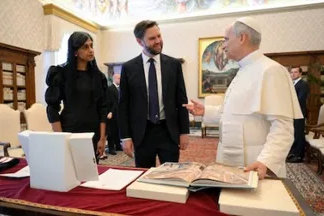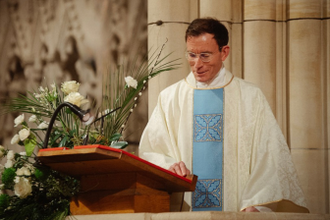Artificial Intelligence, Faith and Ethics at a Crossroads

l-r: Matthew Sanders, Fr Michael Baggot, Jen Copestake, Fr Dominic Robinson and Dr Karen Singarayer. Image: Diocese of Westminster
From the outset of his pontificate, Pope Leo XIV has explained how the development of Artificial Intelligence (AI) inspired the choice of his papal name.
Speaking to the College of Cardinals after his election, he said: "I chose to take the name Leo XIV. There are different reasons for this, but mainly because Pope Leo XIII in his historic encyclical Rerum Novarum addressed the social question in the context of the first great industrial revolution."
"In our own day, the Church offers to everyone the treasury of her social teaching in response to another industrial revolution and to developments in the field of artificial intelligence that pose new challenges for the defence of human dignity, justice, and labour."
With serendipitous timing, the Catholic Union, in collaboration with Farm Street Church, Mayfair, hosted a panel discussion last Sunday 18th May entitled 'AI, Faith and Ethics at a Crossroads: Discerning the Way Forward' which explored the moral and spiritual challenges in this time of technological transformation. The event was convened and chaired by Farm Street Parish Priest, Fr Dominic Robinson SJ.
In her opening remarks, Dr Karen Singarayer, Vice-Chair of the Catholic Union of Great Britain, highlighted the opportunities and risks of the development of AI. She said: "The artificial intelligence revolution holds both promise and peril. The AI revolution seems to be impacting not only manual labourers but also professionals. The written word, once the exclusive realm of the human mind, is now increasingly the domain of machines. Video and audio too are more and more frequently AI-generated. Professions that long commanded social respect as learned or creative vocations now seem vulnerable in the face of the machine."
She added: "These developments prompt us to ask difficult questions - what does it mean to be truly present to another human being? How are relationships, education, healthcare, and even evangelisation being reshaped by the advent of AI?"
Dr Singarayer paid tribute to the late Pope Francis as the leading moral voice regarding AI. He was ever mindful of the common good she said and noted his warning about the catastrophic consequences of allowing instruments of war to develop way beyond human oversight.
Jen Copestake, Correspondent at China Global Television Network Europe, said: "AI is no longer a matter of speculation; it is deeply embedded in all of our lives. We stand at a crossroads-not just technological, but moral and philosophical. As AI becomes more capable, present and even humanlike, the question is not just what it can do, but what should we do."
She pointed to the pitfalls of AI which was not always programmed to embrace human diversity and posed the question whether soul-less machines with no human history could replicate human empathy and dignity.
Ms Copestake cited a prediction that, by 2030, 375 million workers globally would be forced to migrate or 'transition' and recollected that in Laudato Si Pope Francis had insisted that technological change should never render a person obsolete.
She spoke of the "seismic effect" of a predicted 70 per cent of jobs being transformed by AI and the imperative of protecting workers and the meaning behind the work they did which might, as Pope Francis had pondered, necessitate the move to introducing a universal basic income in order to preserve human dignity.
Furthermore, she continued, it was necessary to work upon improving the ecological impact of AI which was dependent on massive energy consumption. According to Catholic social teaching on ethical stewardship, harnessing the world's resources should be sustainable not extractive.
Speaking on AI's use in Evangelisation, Matthew Harvey Sanders, CEO of Longbeard, Creator of Magisterium AI, said: "What we found is that there's a lot of people out there who aren't ready to step into a church and talk to a priest or share their concerns, but they are ready to test their problem, their query out on a chatbot. . . . This isn't a question of trying to replace the priest at all. It's just recognizing where people are at. . . . We've seen testimonials of people who started a journey to the church or had misconceptions clarified. It's been a beautiful project."
He hailed the accelerated polyglot digitization of the Church's library holdings and the World's first Catholic language AI model Ephrem designed to offer deep insights into the teachings of the Church.
Fr Michael Baggot, Professor of Theology at Pontifical University of St Thomas Aquinas, Rome, spoke about how the Church is founded upon relationship, with God and each other. He said: "We are masters of communion. We are masters of relationship. We follow a God of relationship, not a solitary God, but a God who is eternal exchange of interpersonal love. If we're made in the image of that God, we are called into being by a God of communion for communion-with that God and with the other persons made in the image of that God. We were made for interpersonal communion."
The Church, he said, is "expert in humanity'" adding "I hope we know how to accompany people and their most profound needs."
He warned against the abuses of AI's virtual world, seductive and damaging as it moved from an attention economy to an affection economy but was lacking in compassion and an interior life.
Fr Baggot warned, too, against the possibility of "outsourcing" moral agency. While AI worked with data and statistical patterns it should never replace human responsibility. The Church insisted on equity, sexual and racial, he said.
Responding to audience questions, the panel hoped that greater efficiency through AI could liberate from certain forms of toil but feared that job losses could lead to social unrest and scapegoating. They feared, too, information overdrive and saturation.
AI should never replace the gift of humanity and personhood, underscored by the fundamental truth of the incarnational God, who took on our human flesh and blood, and served 'fleshly' human beings. Rather AI should be based upon human wisdom. Now was the time for discernment.
Watch the entire event HERE.


















